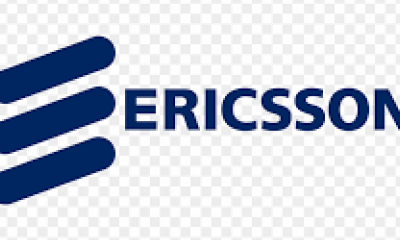Technology
Ericsson Boosts 5G Services With New Software Solution

By Aduragbemi Omiyale
A new software solution that will enable communications service providers to deliver customised 5G services with guaranteed performance has been introduced by Ericson.
The innovation, a 5G network slicing solution for radio access networks (RAN), was built on Ericsson radio expertise and scalable and flexible architecture.
According to a statement from Ericsson, the 5G RAN slicing technology allocates radio resources at one-millisecond scheduling and supports multi-dimensional service differentiation handling across slices.
This strengthens end-to-end slicing capabilities for dynamic resource management and orchestration that ensure the high-quality end-user experience required by diverse use cases.
“Ericsson 5G RAN slicing dynamically optimizes radio resources to deliver significantly more spectrum-efficient radio access network slicing.
“What makes our solution distinct is that it boosts end-to-end management and orchestration support for fast and efficient service delivery.
“This gives service providers the differentiation and guaranteed performance needed to monetize 5G investments with diverse use cases.
“With 5G as an innovation platform, we continue to drive value for our customers,” the Head of Product Area Networks at Ericsson, Per Narvinger, was quoted as saying in the statement.
Also commenting, the Executive Officer and Chief Director of Mobile Technology at KDDI, Toshikazu Yokai, noted that, “End-to-end slicing is key to monetizing 5G investment and RAN slicing will help make that happen. Across different slices in our mobile networks, RAN slicing will deliver the quality assurance and latency required by our customers.”
The Director of Networks and Service Platforms at Strategy Analytics, Sue Rudd, noted that, “Ericsson is the first vendor to offer a full end-to-end solution with RAN slicing based on dynamic radio resource partitioning in under one millisecond using embedded radio control mechanisms to assure Quality of Service, Over the Air, in real-time.
“This truly end-to-end approach integrates radio optimization with policy-controlled network orchestration to deliver inherently secure virtualized private RAN slicing without the loss of the 30 – 40 per cent spectrum capacity due to ‘hard slicing’. Ericsson’s real-time dynamic RAN slicing bridges the ‘RAN gap’ to make e2e slicing profitable.”
For Mark Düsener, Head of Mobile and Mass Market Communication at Swisscom, “We’re gearing up for the next stage of 5G where we expect to apply end-to-end network slicing and RAN slicing is key to guaranteed performance.
“With efficient sharing of network resources across different slices, we will be able to provide communications for diverse 5G applications such as Public Safety or Mobile Private Networks.”
Network slicing is one of the major 5G deployment models and Ericsson has ongoing 5G network slicing engagements for RAN, transport, core network and orchestration across the globe involving use cases for the consumer segment and enterprises/industry verticals such as video-assisted remote operations, AR/VR, TV/Media for sports event streaming, cloud gaming, smart city, and applications for Industry 4.0 and public safety.
Technology
Leticia Otomewo Becomes Secure Electronic Technology’s Acting Secretary

By Aduragbemi Omiyale
One of the players in the Nigerian gaming industry, Secure Electronic Technology (SET) Plc, has appointed Ms Leticia Otomewo as its acting secretary.
This followed the expiration of the company’s service contract with the former occupier of the seat, Ms Irene Attoe, on January 31, 2026.
A statement to the Nigerian Exchange (NGX) Limited on Thursday said Ms Otomewo would remain the organisation’s scribe in an acting capacity, pending the ratification and appointment of a substantive company secretary at the next board meeting.
She was described in the notice signed by the Managing Director of the firm, Mr Oyeyemi Olusoji, as “a results-driven executive with 22 years of experience in driving business growth, leading high-performing teams, and delivering innovative solutions.”
The acting secretary is also said to be “a collaborative leader with a passion for mentoring and developing talent.”
“The company assures the investing public that all Company Secretariat responsibilities and regulatory obligations will continue to be discharged in full compliance with the Companies and Allied Matters Act, applicable regulations, and the Nigerian Exchange Limited Listing Rules,” the disclosure assured.
Meanwhile, the board thanked Ms Attoe “for professionalism and contributions to the Company during the period of her engagement and wishes her well in her future endeavours.”
Technology
Russia Blocks WhatsApp Messaging Service

By Adedapo Adesanya
The Russian government on Thursday confirmed it has blocked the WhatsApp messaging service, as it moves to further control information flow in the country.
It urged Russians to use a new state-backed platform called Max instead of the Meta-owned service.
WhatsApp issued a statement earlier saying Russia had attempted to “fully block” its messaging service in the country to force people toward Max, which it described as a “surveillance app.”
“Today the Russian government attempted to fully block WhatsApp in an effort to drive people to a state-owned surveillance app,” WhatsApp posted on social media platform X.
“Trying to isolate over 100 million users from private and secure communication is a backwards step and can only lead to less safety for people in Russia,” it said, adding: “We continue to do everything we can to keep users connected.”
Russia’s latest move against social media platforms and messaging services like WhatsApp, Signal and Telegram comes amid a wider attempt to drive users toward domestic and more easily controlled and monitored services, such as Max.
Russia’s telecoms watchdog, Roskomnadzor, has accused messaging apps Telegram and WhatsApp of failing to comply with Russian legislation requiring companies to store Russian users’ data inside the country, and of failing to introduce measures to stop their platforms from being used for allegedly criminal or terrorist purposes.
It has used this as a basis for slowing down or blocking their operations, with restrictions coming into force since last year.
For Telegram, it may be next, but so far the Russian government has been admittedly slowing down its operations “due to the fact that the company isn’t complying with the requirements of Russian legislation.”
The chat service, founded by Russian developers but headquartered in Dubai, has been a principal target for Roskomnadzor’s scrutiny and increasing restrictions, with users reporting sluggish performance on the app since January.
Technology
Nigerian AI Startup Decide Ranks Fourth Globally for Spreadsheet Accuracy

By Adedapo Adesanya
Nigerian startup, Decide, has emerged as the fourth most accurate Artificial Intelligence (AI) agent for spreadsheet tasks globally, according to results from SpreadsheetBench, a widely referenced benchmark for evaluating AI performance on real-world spreadsheet problems.
According to the founder, Mr Abiodun Adetona, the ranking places Decide alongside well-funded global AI startups, including Microsoft, OpenAI, and Anthropic.
Mr Adetona, an ex-Flutterwave developer, also revealed that Decide now has over 3,000 users, including some who are paying customers, a signal to the ability of the startup to scale in the near future.
SpreadsheetBench is a comprehensive evaluation framework designed to push Large Language Models (LLMs) to their limits in understanding and manipulating spreadsheet data. While many benchmarks focus on simple table QA, SpreadsheetBench treats a spreadsheet as a complex ecosystem involving spatial layouts, formulas, and multi-step reasoning. So far, only three agents rank higher than Decide, namely Nobie Agent, Shortcut.ai, and Qingqiu Agent.
Mr Adetona said SpreadsheetBench measures how well AI agents can handle practical spreadsheet tasks such as writing formulas, cleaning messy data, working across multiple sheets, and reasoning through complex Excel workflows. Decide recorded an 82.5% accuracy score, solving 330 out of 400 verified tasks.
“The result reflects sustained investment in applied research, product iteration, and learning from real-world spreadsheet workloads across a wide range of use cases,” Mr Adetona told Business Post.
For Mr Adetona, who built Decide out of frustration with how much time professionals spend manually cleaning data, debugging formulas, and moving between sheets, “This milestone highlights how focused engineering and domain-specific AI development can deliver frontier-level performance outside of large research organisations. By concentrating on practical business data problems and building systems grounded in real user environments, we believe smaller teams can contribute meaningfully to advancing applied AI.”
“For Decide, this is a foundation for continued progress in intelligent spreadsheet and analytics automation,” he added.
-

 Feature/OPED6 years ago
Feature/OPED6 years agoDavos was Different this year
-
Travel/Tourism10 years ago
Lagos Seals Western Lodge Hotel In Ikorodu
-

 Showbiz3 years ago
Showbiz3 years agoEstranged Lover Releases Videos of Empress Njamah Bathing
-

 Banking8 years ago
Banking8 years agoSort Codes of GTBank Branches in Nigeria
-

 Economy3 years ago
Economy3 years agoSubsidy Removal: CNG at N130 Per Litre Cheaper Than Petrol—IPMAN
-

 Banking3 years ago
Banking3 years agoSort Codes of UBA Branches in Nigeria
-

 Banking3 years ago
Banking3 years agoFirst Bank Announces Planned Downtime
-

 Sports3 years ago
Sports3 years agoHighest Paid Nigerian Footballer – How Much Do Nigerian Footballers Earn














